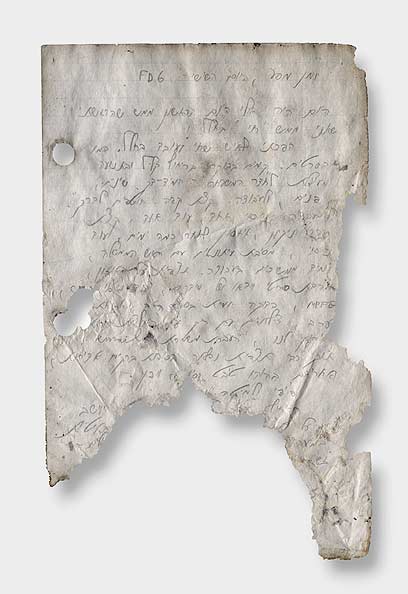Philadelphia Mayor Michael Nutter, speaking at last night's Jewish Publication Society 120th Anniversary Banquet, could not constrain himself from talking about the topic that everyone else could barely constrain themselves from talking about: the Phillies.
Seriously: he got up to the microphone, and there wasn't even a pretense of his being more qualified to speak than the impressive assortment of professors, scholars, and philanthropists in the room (not to mention Norma Shapiro, the first female federal judge in the country), much less the expected "Wow, this is odd -- I'm speaking to a random roomful of Jews." No, sir: in his red tie and white shirt, Mayor Nutter said the exact thought everyone else had been trying to articulate all day: "How about those Phils, ladies and gentlemen. I can't believe it. The Phillies."
He paused, changed his approach, and then said something -- and that's when the profundity hit.
"It's not how much you get knocked down, it's how much you get back up. I think that's something that Philadelphians understand about their sports teams, and they understand it about their lives."
The entire night was a pretty spectacular spectacular. Not quite sure what to do, we stood around with glasses of wine in hand, trying to look at least medium-dignified to the half-full but growing crowd of people who seemed to be born into dignitariness. The weirdest part of these affairs, the rather formal ones where you don't know anyone, is by far the name badges. They're always printed in too-fine type, always on display in dimly-lit rooms, and they're always positioned over a part of the body that isn't really sociable to be looking at.
So I met people, wondering whether I was supposed to know them, finding out (relieved, and then intrigued) that the answer was no. And then someone came over and introduced herself, and it was Rena Potok, the Senior Acquisitions Editor, who I've been emailing with for a year, and who was quite abubble -- about new projects, the projects that were on display, and most of all about their new YavNet project, and JPS's forays into multimedia:
Friday, October 31, 2008
Black Ties in Philadelphia
Labels: excessive displays of formality, jewish publishers, jps, jt waldman, MJL, philadelphia, phillies
Posted by matthue at 9:20 AM
Saturday, October 11, 2008
What We Leave Behind
During Yom Kippur services this year, I came up with the best praying strategy I've ever had, I think. It's the kind of thing that makes you want to write it down and look it up next year...except, of course, I never do.
I'm a regular Ashkenazic guy. Blase Hungarian features, thick Carpathian mountain hair, the same prayerbook as half the universe uses...but, for Yom Kippur, I wound up in a Chabad synagogue. Chabad uses a different nusach than most of the rest of the universe. (It's technically called "Nusach ha'Ari," after the Arizal, except that he'd been dead several hundred years when it was invented by the Alter Rebbe, the first Rebbe of Chabad.) To make a long story much shorter, it's mostly the same prayers, in an almost completely different order than, ahem, normal...or, "normal" if you're a Carpathian like me.
We prayed all day yesterday, except for a 20-minute break at 4:30 or so to pop home and see my daughter. Most of it was silent, to ourselves, punctuated sporadically by a call-and-response hymnal, or a sudden moment on the part of the prayer leader of "Hey! This would sound really good sung aloud." (I can only guess that's what he was thinking. I was praying with a 100-year-old machzor that used to be my great-grandmother's; there's no call-and-response instructions, only big text and little text.) Anyway, for about three-quarters of those responsive readings, I was on a totally different page -- in a different section, and on a different mental plane.
And it was totally great.
With nothing to cling to, all I could cling to were the words. As a result of working here (and from a couple years of praying every day) my Hebrew's getting better, and individual words stuck out at me as I went -- healing; forgiveness; screw up. ("Screw up" is my personal translation of "to sin," since there isn't any literal sinning in Judaism.) But the more I went, the closer I got to that ideal relationship that all the rabbis talk about when they talk about Yom Kippur: the idea that it's just you and God alone in a room, and you're not sure whether to say "thank you" or "I'm sorry," and you end up saying both.
That's where this whole confusion about YoKo comes from. Nobody ever says "Happy Yom Kippur!" But people who regard it as sad and mournful aren't getting the whole picture, either. There's a story in the Talmud about how, when we fast, God is fasting, too. Not because God is getting ready to make harsh judgments on us, but because God doesn't want to make harsh judgments, and God's hoping not to have to.
It also got me thinking about the recent exhibition of the diary of Ilan Ramon, the Israeli astronaut killed in the Columbia crash. Thirty miles from the crash site, in the middle of a field in Texas, a farmer found the pages -- literally the last thing in life that he left behind. Paper is one of the most intangible, temporary things to leave. But praying, talking, our secret whispers -- if we die this coming year, that's all that we have left, too. Words? Emotions? Complaints? But if you're saying something good, it's nothing to be ashamed of at all.

crossposted from MyJewishLearning
Labels: chabad, israel, israelis in space, MJL, space ships, yom kippur
Posted by matthue at 8:22 PM
















